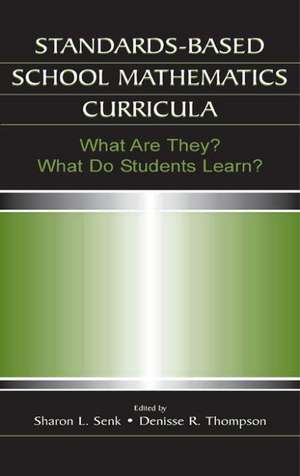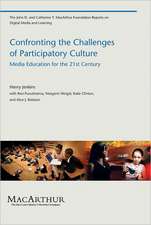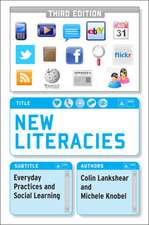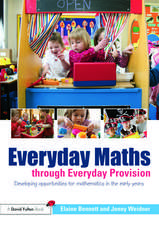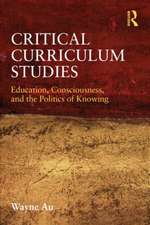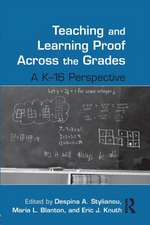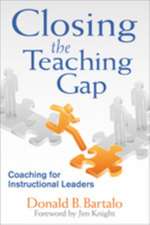Standards-based School Mathematics Curricula: What Are They? What Do Students Learn?: Studies in Mathematical Thinking and Learning Series
Editat de Sharon L. Senk, Denisse R. Thompsonen Limba Engleză Paperback – sep 2003
To answer these questions, the editors invited researchers who had investigated the implementation of 12 different Standards-based mathematics curricula to describe the effects of these curricula on students' learning and achievement, and to provide evidence for any claims they made. In particular, authors were asked to identify content on which performance of students using Standards-based materials differed from that of students using more traditional materials, and content on which performance of these two groups of students was virtually identical. Additionally, four scholars not involved with the development of any of the materials were invited to write critical commentaries on the work reported in the other chapters.
Section I of Standards-Based School Mathematics Curricula provides a historical background to place the current curriculum reform efforts in perspective, a summary of recent recommendations to reform school mathematics, and a discussion of issues that arise when conducting research on student outcomes. Sections II, III, and IV are devoted to research on mathematics curriculum projects for elementary, middle, and high schools, respectively. The final section is a commentary by Jeremy Kilpatrick, Regents Professor of Mathematics Education at the University of Georgia, on the research reported in this book. It provides a historical perspective on the use of research to guide mathematics curriculum reform in schools, and makes additional recommendations for further research. In addition to the references provided at the end of each chapter, other references about the Standards-based curriculum projects are provided at the end of the book.
This volume is a valuable resource for all participants in discussions about school mathematics curricula--including professors and graduate students interested in mathematics education, curriculum development, program evaluation, or the history of education; educational policy makers; teachers; parents; principals and other school administrators. The editors hope that the large body of empirical evidence and the thoughtful discussion of educational values found in this book will enable readers to engage in informed civil discourse about the goals and methods of school mathematics curricula and related research.
| Toate formatele și edițiile | Preț | Express |
|---|---|---|
| Paperback (1) | 677.71 lei 6-8 săpt. | |
| Taylor & Francis – sep 2003 | 677.71 lei 6-8 săpt. | |
| Hardback (1) | 1103.66 lei 6-8 săpt. | |
| Taylor & Francis – sep 2002 | 1103.66 lei 6-8 săpt. |
Din seria Studies in Mathematical Thinking and Learning Series
-
 Preț: 272.41 lei
Preț: 272.41 lei -
 Preț: 332.83 lei
Preț: 332.83 lei -
 Preț: 176.46 lei
Preț: 176.46 lei - 8%
 Preț: 390.48 lei
Preț: 390.48 lei -
 Preț: 785.85 lei
Preț: 785.85 lei -
 Preț: 322.46 lei
Preț: 322.46 lei -
 Preț: 258.43 lei
Preț: 258.43 lei -
 Preț: 258.37 lei
Preț: 258.37 lei - 15%
 Preț: 557.87 lei
Preț: 557.87 lei -
 Preț: 383.84 lei
Preț: 383.84 lei -
 Preț: 469.57 lei
Preț: 469.57 lei - 15%
 Preț: 462.30 lei
Preț: 462.30 lei - 18%
 Preț: 765.90 lei
Preț: 765.90 lei -
 Preț: 480.00 lei
Preț: 480.00 lei -
 Preț: 204.42 lei
Preț: 204.42 lei -
 Preț: 354.84 lei
Preț: 354.84 lei - 15%
 Preț: 565.03 lei
Preț: 565.03 lei -
 Preț: 392.13 lei
Preț: 392.13 lei - 18%
 Preț: 1257.28 lei
Preț: 1257.28 lei -
 Preț: 367.61 lei
Preț: 367.61 lei - 15%
 Preț: 433.55 lei
Preț: 433.55 lei -
 Preț: 281.09 lei
Preț: 281.09 lei -
 Preț: 412.13 lei
Preț: 412.13 lei -
 Preț: 479.00 lei
Preț: 479.00 lei -
 Preț: 415.51 lei
Preț: 415.51 lei - 15%
 Preț: 465.00 lei
Preț: 465.00 lei - 15%
 Preț: 577.03 lei
Preț: 577.03 lei -
 Preț: 477.76 lei
Preț: 477.76 lei -
 Preț: 207.88 lei
Preț: 207.88 lei -
 Preț: 434.14 lei
Preț: 434.14 lei -
 Preț: 482.34 lei
Preț: 482.34 lei -
 Preț: 400.40 lei
Preț: 400.40 lei - 15%
 Preț: 467.41 lei
Preț: 467.41 lei -
 Preț: 349.69 lei
Preț: 349.69 lei - 18%
 Preț: 1043.65 lei
Preț: 1043.65 lei - 15%
 Preț: 439.66 lei
Preț: 439.66 lei
Preț: 677.71 lei
Preț vechi: 797.31 lei
-15% Nou
Puncte Express: 1017
Preț estimativ în valută:
129.76€ • 135.12$ • 107.66£
129.76€ • 135.12$ • 107.66£
Carte tipărită la comandă
Livrare economică 14-28 februarie
Preluare comenzi: 021 569.72.76
Specificații
ISBN-13: 9780805850284
ISBN-10: 0805850287
Pagini: 536
Dimensiuni: 210 x 280 x 27 mm
Greutate: 0.99 kg
Ediția:1
Editura: Taylor & Francis
Colecția Routledge
Seria Studies in Mathematical Thinking and Learning Series
Locul publicării:Oxford, United Kingdom
ISBN-10: 0805850287
Pagini: 536
Dimensiuni: 210 x 280 x 27 mm
Greutate: 0.99 kg
Ediția:1
Editura: Taylor & Francis
Colecția Routledge
Seria Studies in Mathematical Thinking and Learning Series
Locul publicării:Oxford, United Kingdom
Cuprins
Contents: Preface. Part I: Introduction. S.L. Senk, D.R. Thompson, School Mathematics Curricula: Recommendations and Issues. Part II: Elementary Grades Curriculum Projects. D.R. Thompson, S.L. Senk, Elementary School Mathematics Curriculum Reform. A. Carter, J.S. Beissinger, A. Cirulis, M. Gartzman, C.R. Kelso, P. Wagreich, Student Learning and Achievement With Math Trailblazers. W.M. Carroll, A. Isaacs, Achievement of Students Using the University of Chicago School Mathematics Project's Everyday Mathematics. J. Mokros, Learning to Reason Numerically: The Impact of Investigations. V. Battistich, S. Alldredge, I. Tsuchida, Number Power: An Elementary School Program to Enhance Students' Mathematical and Social Development. R.T. Putnam, Commentary on Four Elementary Mathematics Curricula. Part III: Middle Grades Curriculum Projects. S.L. Senk, D.R. Thompson, Middle School Mathematics Curriculum Reform. J.E. Ridgway, J.S. Zawojewski, M.N. Hoover, D.V. Lambdin, Student Attainment in the Connected Mathematics Curriculum. T.A. Romberg, M.C. Shafer, Mathematics in Context (MiC)-- Preliminary Evidence About Student Outcomes. R. Billstein, J. Williamson, Middle Grades MATH Thematics: The STEM Project. M.F. Chappell, Keeping Mathematics Front and Center: Reaction to Middle-Grades Curriculum Projects Research. Part IV: High School Curriculum Projects. D.R. Thompson, S.L. Senk, High School Mathematics Curriculum Reform. H.L. Schoen, C.R. Hirsch, The Core-Plus Mathematics Project: Perspectives and Student Achievement. D. Cichon, J.G. Ellis, The Effects of MATH Connections on Student Achievement, Confidence, and Perception. N.L. Webb, The Impact of the Interactive Mathematics Program on Student Learning. J.W. Lott, J. Hirstein, G. Allinger, S. Walen, M. Burke, M. Lundin, T.A. Souhrada, D. Preble, Curriculum and Assessment in SIMMS Integrated Mathematics. S.L. Senk, Effects of the UCSMP Secondary School Curriculum on Students' Achievement. J. Swafford, Reaction to High School Curriculum Projects Research. Part V: Final Commentary. J. Kilpatrick, What Works?
Notă biografică
Sharon L. Senk and Denisse R. Thompson
Descriere
Presents the results of a major NSF-funded study to gather, analyze, and synthesize the research on K-12 student outcomes in standards-based mathematics curriculum projects. Audiences include math ed researchers, policymakers, teachers, etc.
